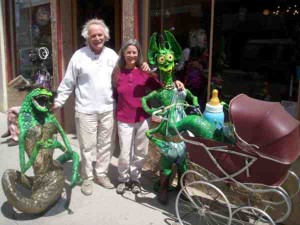Brief by Central Staff
Water – June 2008 – Colorado Central Magazine
There are frequently proposals to take water out of Central Colorado. Usually, though, the scheme involves a complex array of trnsfers of points of diversion, estimates of the consumptive use involved, more estimates involving transport losses, and other considerations that keep water lawyers and engineers gainfully employed.
But a new proposal is rather straightforward; Nestlé, the Swiss-based multinational food company known for its chocolate, plans to haul the water away in tanker trucks for its “Arrowhead® Brand Mountain Spring Water” which comes from “places where mother earth and our meticulous bottling process have co-existed in harmony for generations.”
In this case, the harmonious co-existence would start with water from some springs near Nathrop that would be trucked to a bottling plant in Denver. The company proposes to take 0.3 cubic feet per second (also known as a cusec or cfs), which works out to about 135 gallons per minute, or 194,400 gallons per day. That works out to about 30 round-trips per day.
Under Colorado water law, Nestlé has to make up for the water it takes out of the basin (or “augment” it in legalese), so that senior users downstream don’t lose water they’re entitled to. The company has offered to buy augmentation water from the City of Salida, which currently has some to spare.
Should the city do this? We think not. At most, Nestlé will produce one extra local job, that of a caretaker. All the “value-added” activity will be in Denver. We’d just be exporting raw materials on the cheap.
If the water were being shipped by rail (an impossibility at the moment since the line is out of service), that would be one thing, but the 30 daily round-trip truckloads on U.S. 285 is quite another. Additional heavy truck traffic certainly won’t make that twisting road any safer; nor will it inspire more tourism. The water trucks, by our calculation, will burn about 1,650 gallons of diesel fuel every day, and more fuel consumption is just what we don’t need these days.
In other words, we don’t see why any local public entity should lend support to this proposal, for there’s no benefit to local residents. Nestlé can doubtless get its augmentation water from some other entity, if necessary, but since it’s a private enterprise, let’s avoid public involvement and let the private sector worry about the private sector.


